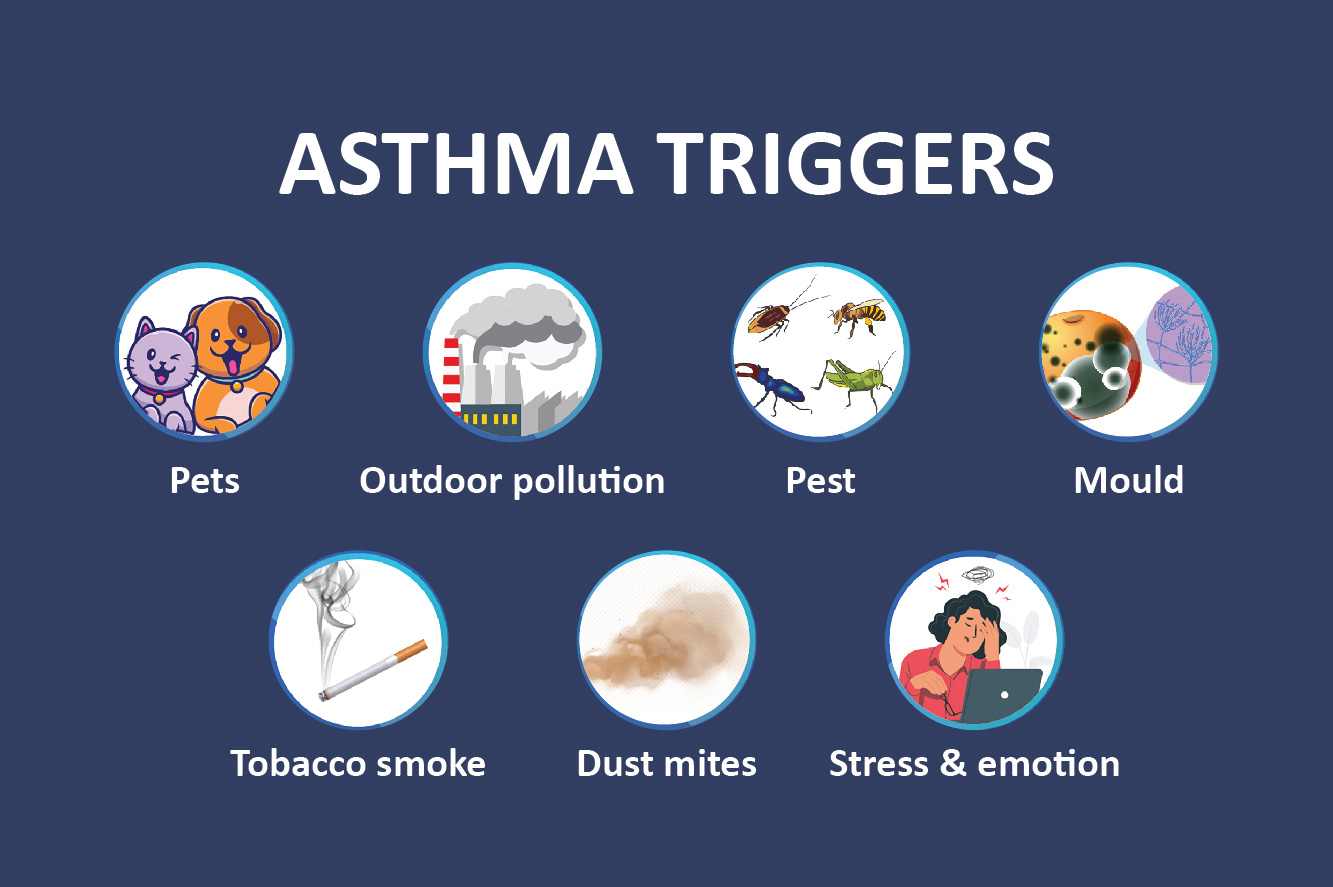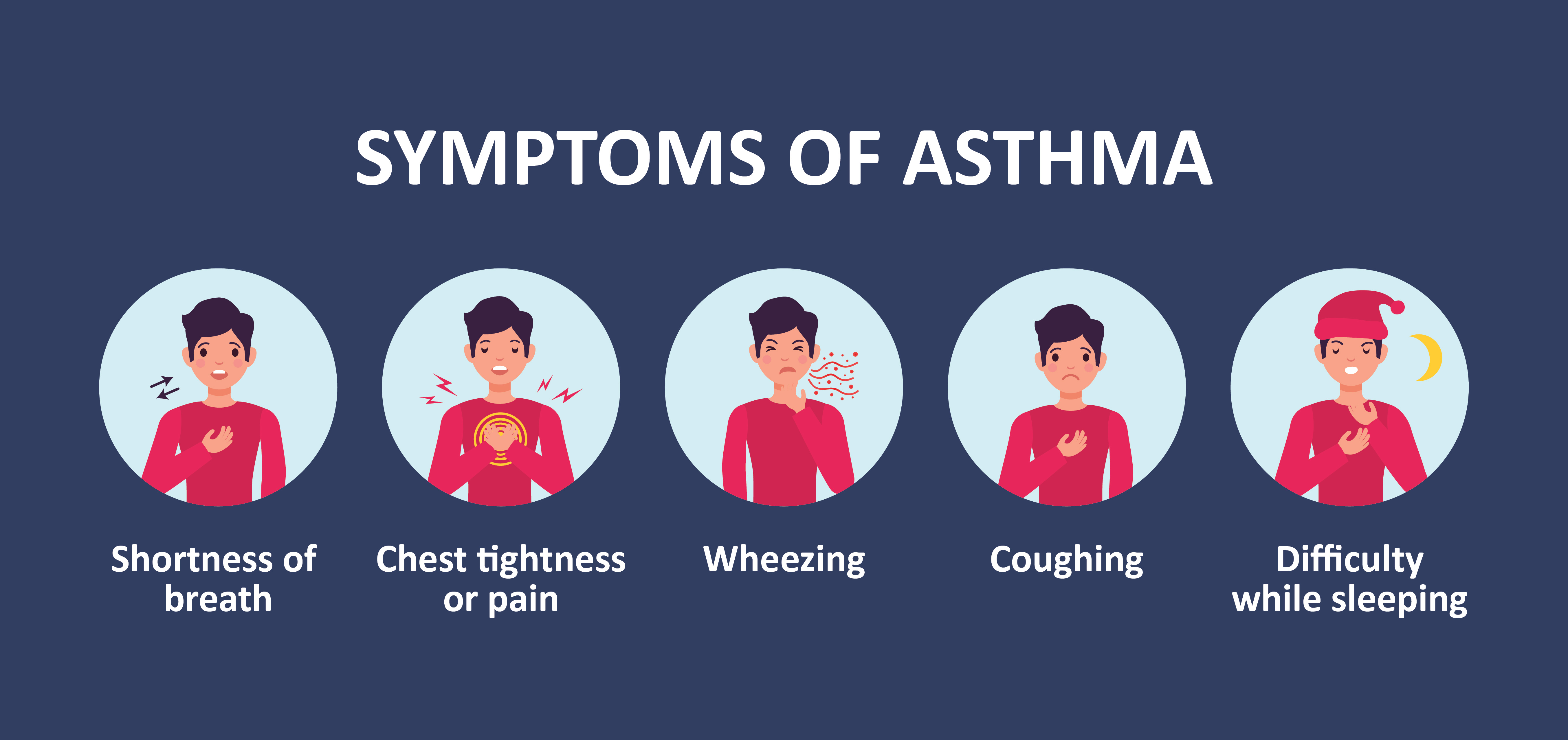Common asthma triggers:

Pollen, smoking, exercise, mould, infections, food, medicine, dust, dust mites, stress, pollution, pets or cold air.
Pets:

If you have an allergy to furry animals, it can cause an asthma attack. You might want to locate the animal a new home if you suspect it is the source of attacks. Reduce your exposure by keeping pets out of beds, washing furry creatures, using an air cleaner, and utilising allergen-proof mattress and pillow coverings if you are unable or unwilling to find a new home for the animal.
Outdoor pollution:

Outdoor air pollution can trigger an Asthma attack. Numerous things, such as automobiles, industry, and smoke from wildfires, can contribute to this pollution. Smoke from wildfires produced by burning plants or timber contains both microscopic particles and hazardous substances. Too much exposure to this smoke can trigger an Asthma attack.
Pest:

Where food is consumed and crumbs are left behind, cockroaches and other bugs are frequently discovered. For pest management in your home: Eliminate as many sources of food and water as you can. Dishes, crumbs, and spills must be cleaned right away. Use airtight containers to store food. Keep trash in a container that is closed. Vacuum or sweep at least twice a week. Clean and clear the clutter off the floors, tables, sinks, and counters. Sprays and foggers should not be used as they can trigger asthma attacks.
Mould:

No matter if you have a mould allergy or not, mould can cause an asthma attack. Mould can grow indoors in damp spaces like bathrooms, basements, and kitchens as well as in places where there has been water damage.
To lessen the risk of mould exposure in your home: To avoid the growth of mould, dry damp or wet objects within 24 to 48 hours. Fix water leaks, such as plumbing leaks, which promote the growth of mould. To maintain low interior humidity, use a dehumidifier or air conditioner.
Tobacco smoke:

Smoking tobacco is bad for everyone, but it's especially bad for asthmatics. If you smoke and have asthma, give up the habit. Smoke produced by a smoker and inhaled by another person is referred to as "second-hand smoke." An Asthma attack can be brought on by second-hand smoke. Make your home a no-smoking area. Family members who smoke should be encouraged to quit.
Dust mites:

Microscopic insects called dust mites are common in many households. Dust mites can cause an asthma attack if you have the allergy and have asthma. To stop attacks- create a barrier between you and dust mites by using allergen-resistant mattress and pillowcase covers. Vacuum your floors, carpets, and area rugs frequently, and wash your linens once a week. Reduce the relative humidity inside the house.
Stress and emotion:

Asthma is frequently brought on by stress and strong emotions. According to research, stress, particularly persistent or long-lasting stress, might make inflammation worse.
Methods for lowering stress- Take action to lessen the various occurrences or circumstances in your life that are stressful. You can lessen stress by using frequent stress-reduction strategies including deep breathing, meditation, and yoga. Create a routine fitness programme and wholesome dietary practises. Social engagement that is healthy lowers stress.

Food and medicine allergy:
A lot of asthmatics have trouble eating particular foods. This is especially true with meals that have sulfites, which are preservatives. Beer, wine, shrimp, and potatoes that have been processed all contain sulfites.
Some medications, particularly beta-blockers and aspirin, might have negative side effects. Discuss all of the prescription and over-the-counter medications you take with your doctor.
Avoid any foods or medications that aggravate your asthma. Sulfite-containing foods should be avoided. When appropriate, substitute medications, such as acetaminophen for aspirin.
Reflux and heartburn:
Reflux, often known as GERD (gastroesophageal reflux disease), creates a burning sensation in the chest and is frequently referred to as "heartburn." The oesophagus, often known as the food pipe or swallowing tube, is affected by stomach acids or meals that come up into it. The acids eventually make their way to the airways and throat.
Changes in lifestyle may be beneficial. Avoid using smoke, alcohol, or certain foods. You should elevate your head when you sleep. Three hours before going to bed, avoid eating or drinking anything. The use of drugs to regulate stomach acid should be discussed with your healthcare professional. Asthma flare-ups can be caused by reflux, which can also make asthma control challenging. Indigestion, a persistent cough, a sore throat, nasal drainage, and chest pain are all signs of reflux.
Exercise:
While exercise is important for all people, it can trigger asthma symptoms for some. However, regular exercise might help your general and lung health. Don't automatically assume that you should stop exercising if it makes your asthma worse. Instead, create a safe and wholesome fitness regimen with the help of your healthcare provider.
Perform 5 to 10 minutes of warm-up and cool-down activities before and after working out. If your symptoms continue even after you stop exercising, consult your doctor.
Strong smell:
Asthma symptoms can be exacerbated by strong odours, such as those from paints, sprays, cleaning agents, garden chemicals, scented candles, perfumes, lotions, hair sprays, and deodorants. Agarbatti smell and smoke can be a problem as well.
Avoiding these smells as much as you can is the best course of action. When using chemicals, paints, or sprays, stay away from your house until the scent has subsided. Avoid using fragrant goods in or around your home or on your body.
 Call For Appointment
Call For Appointment